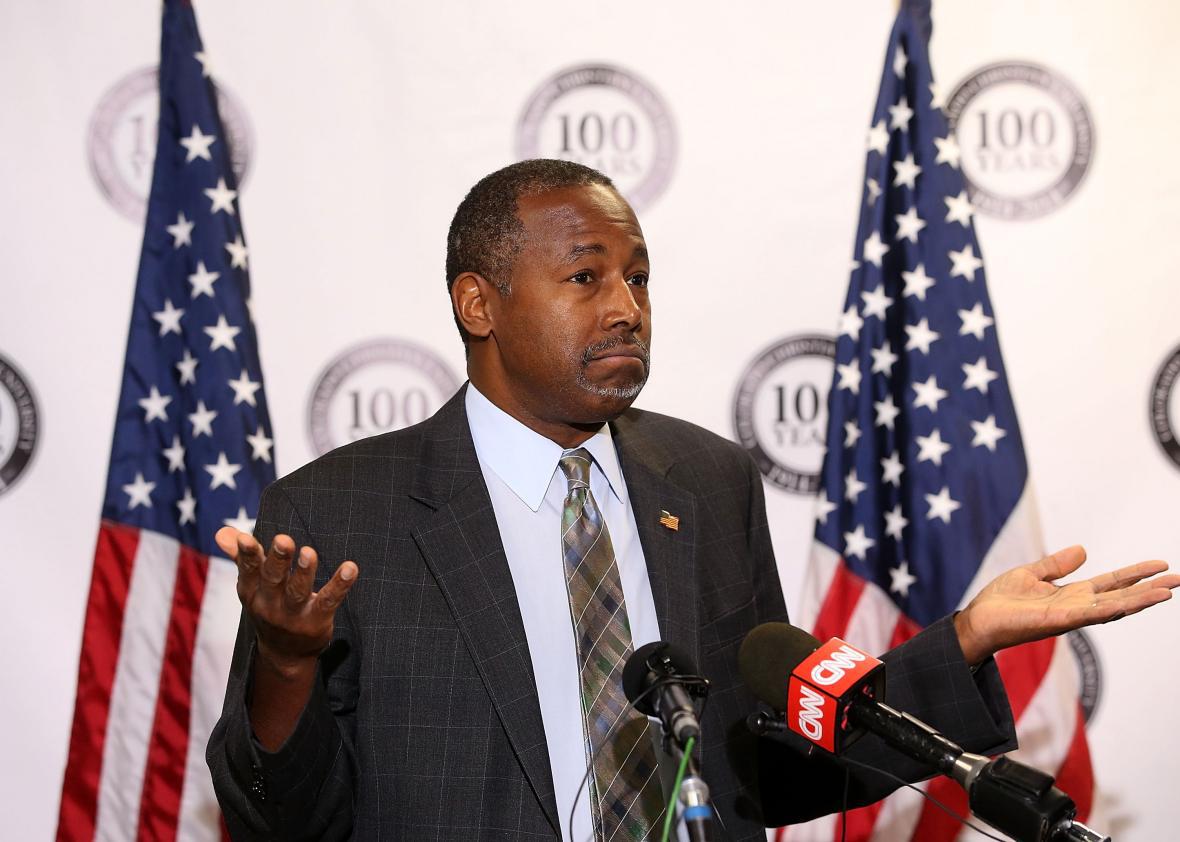Ben Carson is in no danger of being mistaken for a foreign policy expert. In the past week alone, the former neurosurgeon wrongly claimed on the debate stage that China had intervened militarily in Syria—a position that he later defended by suggesting he had “better” intelligence sources than the White House does—and then failed three times during a Fox News interview to name a single ally he would reach out to first to help fight ISIS.
But just in case there was any doubt that Carson lacks a strong grasp on global affairs, two of his own advisers went ahead and suggested just that this week in interviews with the New York Times (emphasis mine):
“Nobody has been able to sit down with him and have him get one iota of intelligent information about the Middle East,” Duane R. Clarridge, a top adviser to Mr. Carson on terrorism and national security, said in an interview. He also said Mr. Carson needed weekly conference calls briefing him on foreign policy so “we can make him smart.” …
[Armstrong] Williams, one of Mr. Carson’s closest friends, who does not have an official role in the campaign, also lamented the Fox News interview. “He’s been briefed on it so many times,” he said. “I guess he just froze.”
Those type of throw-your-candidate-under-the-bus comments would have been newsworthy if they had come from unnamed sources from within Carson’s camp. The fact that they were made during on-the-record interviews with the nation’s paper of record only made them more troubling for the campaign.
Carson’s team wasted little time trying to do some cleanup after the Times story went live, casting Clarridge as “an elderly gentleman” and disputing the paper’s classification of him as one of Carson’s “top” advisers. “Mr. Clarridge has incomplete knowledge of the daily, not weekly briefings, that Dr. Carson receives on important national security matters from former military and State Department officials,” campaign spokesman Doug Watts told Business Insider in an email. If that’s true, it lessens the sting of his comments, but it doesn’t change that fact that a member of Carson’s team is less than impressed with Carson’s ability to get up to speed. (To pick at a different thread: If Carson’s getting briefed on foreign policy daily as opposed to weekly, that’s hardly a case for him being a quick study on foreign policy matters.)
Regardless, the comments illustrate the difficulty Carson’s unlikely campaign faces now that the campaign is being dominated by national security and the Middle East following last week’s terrorist attacks in Paris. As I explained on Monday, Carson and Donald Trump actually entered the conversation with something resembling the upper hand. In a Reuters poll released earlier this month, the two men easily bested the field when respondents were asked whom they trusted most to be commander in chief, negotiate with foreign leaders, and handle our nuclear arsenal. It’s still early, but in the days since Paris, Trump’s been able to press that advantage by playing on voters’ fears, while his fellow outsider has floundered. When Reuters pollsters asked Republican voters this week to choose which of their potential nominees was best-suited to address terrorism following last Friday’s attacks, Trump led the field with 33 percent, followed by Marco Rubio at 17 percent. Carson, meanwhile, tied for third place with Jeb Bush at 9 percent. From the sounds of it, Carson would have fared even worse if the pollsters had surveyed his own campaign.
Elsewhere in Slate:
